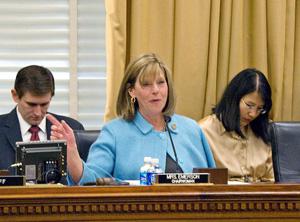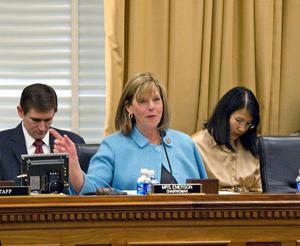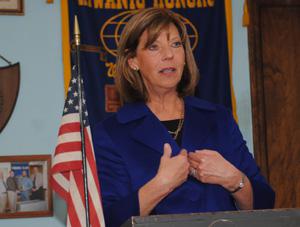
At the beginning of the New Year our thoughts turn from the happy holidays to more mundane things, not the least of which is taxes. Forms start arriving in the mail, folders of receipts emerge from the filing cabinet, and we commence an annual calculation: Will we get a refund or will we owe?
Anyone who has attempted to prepare income or business tax forms knows that the answer to that question can only be discovered with a calculator, an inexhaustible supply of patience, absolute silence, and several hours to spare. The process of preparing our own taxes is more complicated, more frustrating and more time consuming than I think it has been in all of American history.
Making a mistake can turn a slow process into an even slower one, resulting in fines or damaged credit or even more expenses.
The federal government doesn’t make it easy. Changes in the tax code are routinely left to the last minute. Special credits require special forms, each one with pages and pages of instructions, worksheets and tables. Credits are phased in, phased out, hard to find and easy to miss. The Internal Revenue Service provides guidance online, but there are also private tax preparation services and computer programs to help.
The entire U.S. tax code is 70,000 pages long. There are 1,175 different tax forms. The IRS sends out some 8 billion pieces of mail each year. And this year, Americans will pour 6.1 billion long hours and $27.7 billion into preparing their taxes.
Even the Commissioner of the IRS admits to using a tax preparer.
I asked the IRS for a report on how many IRS employees prepare their own tax returns. These are the professionals who advise the public on the dustiest corners of the code. They are the experts, the staffers at the help desks, and the folks who are supposed to catch the mistakes any of the rest of us might make.
So, when I got a response from the IRS last month, I was very surprised to learn that 26 percent of IRS employees use a paid tax preparer and 56 percent use tax preparation computer software.
The short report tells readers that IRS employees are less likely to rely on a paid tax preparer than the general public (which uses these services in 59 percent of cases). But the prevalence of IRS employees who are unwilling or unable to prepare their own tax returns tells all Americans that the system is too complicated, too unwieldy, and too inefficient. I don’t think there is a better case for reform.
Whether you hire a tax preparer, use computer software, or attempt the old method of paper-and-pen, know that you have plenty of company even within the ranks of IRS employees. Also, remember that they are there to help you. The Taxpayer Advocate can help answer questions, and throughout the state there will be public events and resources to assist taxpayers with their 2011 filings.
Take advantage of all the resources at your disposal, prepare your taxes well, and I hope that at the end of the long calculation there is a little of your own money going back into your pockets.
Jo Ann Emerson of Cape Girardeau represents the Eighth District of Missouri in the U.S. House of Representatives.

By Jo Ann Emerson
We’ve devoured the Thanksgiving turkey, shopped ‘til we dropped, and brought our families together for Christmas. Now there’s one more holiday to go in the season as we ring out the old and ring in the New Year.
New Year’s Day is, more than anything, a moment to reflect, to set goals, and to steel ourselves for the year ahead. It’s the first moment our children think about going back to start the new semester of school, and for the rest of us to consider that the balance of winter is still ahead.
In Southern Missouri, there are lots of important resolutions for our congressional district. It’s imperative that the Corps of Engineers complete the levee restoration on the Mississippi River. We need the Small Business Administration to find worthy opportunities to invest in new ideas, and job creation is on everyone’s mind. Congress is beginning in earnest the process of writing a new Farm Bill. And transportation infrastructure is a leading priority in an agenda of economic renewal.
Policymakers and the public are tasked with working together to advance these priorities. On issues ranging far and wide, from agriculture to telecommunications, from tax reform to national defense, from one end of our economy to the other, there is much to do. Employers large and small and families of all sizes depend on the outcomes for their livelihoods, safety, educations, and opportunities.
Though many noses will be to the grindstone, these will not be quiet months for public discussion.
This will, undoubtedly, be a year dominated by politics. It is also an important year for elected officials, however, to make sure the people they represent are heard in our political process. That means helping constituents get timely, complete and accurate responses from their government, as well as pressing for completion of all of the people’s business in our legislative institutions.
We must collectively decide this year if we are going to keep the Affordable Care Act or repeal it, and we must weigh whether or not we will allow the egregious regulatory efforts of the Environmental Protection Agency to move forward.
Simply pushing back isn’t enough. Our congressional district, our communities and our country deserve progress on important issues this year. Agreement and consensus have become dirty words in Washington, but at the New Year we can all reflect on the ways in which public officials serving in the public trust should fulfill their duty to the people they represent. Only by forging agreement can we clear the path forward for a more competitive tax code, for safer and better highways and rivers, for ag policy that promotes growth in all sectors of our rural economy, for protections for our men and women in uniform and for the freedoms of families to hold dear their truest beliefs.
The New Year’s resolutions of a single person can be daunting, but we should all work together to accomplish our commonsense goals for our nation and its future in 2012. Happy New Year to you and yours – I hope it is healthy, safe and (most of all) prosperous.
Jo Ann Emerson of Cape Girardeau represents the Eighth District of Missouri in the U.S. House of Representatives.

By Jo Ann Emerson
In the Old Testament, the Book of Isaiah says, “For unto us a child is born; unto us a son is given.” Isaiah’s words foretold the birth of Christ, and they hold special meaning for all Christians during this blessed season.
But, taken more broadly, the same quote means that we on earth have a responsibility to one another – to be kind, to be charitable, to be patient and good. Every child, from its very first moments, is on its way to joining a community – whether it’s a loving family, one of our Missouri cities, a nation of citizens, or simply taking a rightful place among all of God’s children.
The striking statistics about childhood homelessness released this month, then, should give pause to each and every one of us. In America today, one in 45 children is homeless: 1.6 million of them, with more than half of that number under the age of seven. They sleep in cars at night, they wash up every morning in a gas station bathroom, and they eat what they can get when they can get it.
These homeless American children have no bed to call their own, they cannot gather around a kitchen table to eat or do homework, and they don’t know the safety of a home. As a result, they encounter challenges to their health, hunger and education. Some of these kids overcome the odds. Others find a place at a shelter or a motel room provided by a charitable organization. Still others escape homelessness when the parent who has been looking for a job for months finally finds one.
But there are others who are not so fortunate over the long run. They may live in homes where drugs have taken over the household. They may suffer from untreated illnesses. They may be close to giving up hope as they struggle to keep their families together. It’s a lot to ask from anyone, let alone a child.
When Missourians contribute to charity, when we donate to food banks, when we volunteer and when we make an offering through our places of worship – we are getting involved in the young lives at the heart of this problem.
Helping our homeless is not a religious calling, it is a national calling. Children, veterans, families, the mentally ill – all make up startling proportions of the homeless population. We have a responsibility to care.
I realize it is easy to call our obligation to the homeless to mind at Christmas, but really this is a year-round issue for the nation. Children are living on the street not just in urban areas – it happens in rural America, too, in every state of the Union. Fortunately, in every community, there are organizations using public and private resources to help.
Wonderful counselors, advocates and caseworkers do a great service to the homeless family that needs a short-term stipend for a hotel room. Church volunteers open their doors to serve hot meals to the hungry or to send a bag of groceries home with a mother who needs to feed her kids some protein. And good nurses and medical professionals take it upon themselves to go looking for people who need help; they go into homes where a pregnant mother needs advice on nutrition as she takes care of her unborn baby.
When we all do a little extra to help those who truly need it the most, then soon enough that pregnant mother gives birth. Then, when a child is born, we can all hope for its great opportunity and great things to come.
Jo Ann Emerson of Cape Girardeau represents the Eighth District of Missouri in the U.S. House of Representatives.

By Jo Ann Emerson
The folks at the Environmental Protection Agency are different from the rest of us, that’s for sure. Where you and I drive down a county road and kick up a little dust, they see a cloud of “coarse particulate matter” – and they can barely resist their uncontrollable urge to regulate it.
In rural America, we stir up “coarse particulate matter” when driving down an unpaved road, moving livestock, or working in a dry field. Our farms, ranches, small businesses and local economies encounter these conditions all the time. But the EPA would like to stifle productivity, growth and employment if it means disturbing the dust.
Compliance with EPA dust standards, in the open air, as a farm truck goes down a gravel road, is about the last thing from Missourians’ minds. And it should be. The mere idea that a federal agency would get so deep into the operations of private businesses is offensive to anyone who believes in the basic freedoms, let alone the free market.
Of course, the EPA now says it will not start to regulate dust just yet. However, I have learned to judge federal agencies not by what they say but by what they do. And there are no guarantees that the EPA will continue to ignore regulatory actions that bureaucrats there have pressed forward in the past. We’re not talking about the survival of a small business here, a farm over here and a ranch over there; we’re talking about a threat to the survival of whole industries, primarily in agriculture.
It is clear that Congress must be on the record about farm dust, and now it is. I voted last week in favor of the Farm Dust Regulation Prevention Act and, if the legislation sounds straightforward, it is.
Regulatory overreach is a hallmark of this Administration. Time and again, rules and regulations are laid at the feet of Americans who are attempting to do nothing more than make an honest living.
Not only are burdensome regulations out-of-touch with people who are working for a living all over our country, but they are also directly opposed to the economic opportunity and growth that will grow our economy at a crucial time.
Just last week, the administration issued seven new rules. The compliance cost of just one of them is estimated at more than $140 billion. Altogether, they represent a burden of hundreds of thousands of hours to read, understand, and adapt to new rules. And each one of those dollars and every one of the hours spend struggling to comply with the new rules of the federal government is a dollar or an hour NOT spent on a business, employing a new worker, or investing in the future.
The basic premise of federal regulation is to restrict some kind of activity. When potential regulations reach the point at which we can’t even drive down a country road, we have to ask why there is not more commonsense and accountability from our federal government. An administration which fails to answer to working Americans will soon have to answer to all Americans.
Jo Ann Emerson of Cape Girardeau represents the Eighth District of Missouri in the U.S. House of Representatives.

Seventy years ago, our nation was attacked at Pearl Harbor. In Southern Missouri, many citizens remain among us who lived through that day and the war that followed. They are a present part of our history. They served and sacrificed so that our nation might survive the aftermath of the Japanese massacre that Hawaii morning, December 7, 1941.
Wartime America in the years that followed demonstrated the strength, courage and character of our nation. Every family sacrificed something… a loved one who enlisted, a mother who went to work, or rationing of food, gas and other basic materials. But it was always the tragedy of Pearl Harbor that rallied our spirits during dark times. The memory of that somber day awakened our will to win the war in the Pacific.
Only a few thousand survivors of the battle of Pearl Harbor remain with us today. These Americans, in their eighties, nineties and hundreds, are national treasures and witnesses to a lesson in history we must not let slip.
The defense of our country from all threats, whether known or unknown, is essential to our very freedom.
We cannot be secure or free without the willingness of Americans to serve in uniform, on the vanguard of our shores, in remote places around the world where forces conspire against liberty and democracy.
We must also remember the code of national sacrifice that allowed us to reach our national goal of victory in World War II. Anyone who lived through the era will tell you that the war effort required every American to put country ahead of self. Everyone went without something in order to help our troops accomplish their mission, and doing so united our entire nation in purpose.
Pearl Harbor reminded us, just as September 11th did, that our freedoms make us a target for other nations and organizations around the globe. We are a light of liberty to the rest of the world, but it is not simply the fact of our liberty that makes others envious – it is how well we make use of our liberty to achieve great things.
The ensuing war reminded us that we are unique among nations for what we Americans can accomplish through tremendous combined effort. We must always be ready to make that effort. We must always observe the responsibilities of our freedom.
And, in retrospect, it is clear that the sacrifices of World War II were not made selfishly for the Greatest Generation of that era, but for their children, grandchildren, and great-grandchildren. They gave everything so freedom would survive through the generations. There is no greater gift than that, and no greater debt we must repay.
Unfortunately, it is all too often tragedy or adversity that causes us to realize these precious things about our nation. But the anniversary of a dramatic, unprovoked assault on our nation serves as no better time to recall the great blessings we must protect beneath our ever-present flag.
The motto of the Pearl Harbor Survivors Association serves to instill in us the important legacy of that grave day 70 years ago. It says: “Remember Pearl Harbor – Keep America Alert – Eternal Vigilance Is the Price of Liberty.”
Jo Ann Emerson of Cape Girardeau represents the Eighth District of Missouri in the U.S. House of Representatives.

